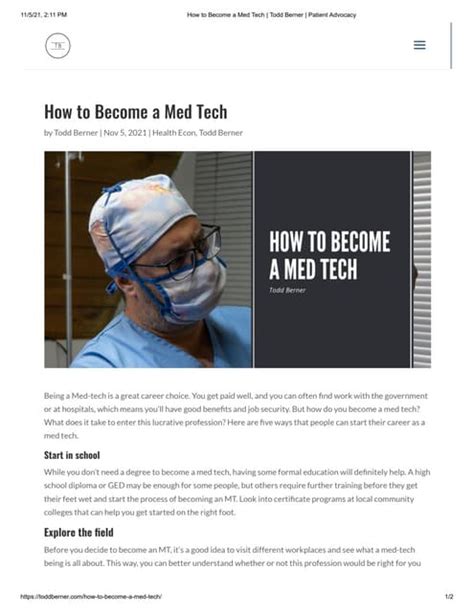The medical technology field is a rapidly growing industry that offers a wide range of career opportunities for individuals who are passionate about healthcare and technology. Medical technologists, also known as medical laboratory scientists, play a vital role in the diagnosis and treatment of diseases by analyzing body fluids, tissues, and cells. If you're interested in pursuing a career as a med tech, here are the 5 steps to become a med tech:

Step 1: Earn a Bachelor's Degree in Medical Technology
The first step to becoming a med tech is to earn a bachelor's degree in medical technology or a related field. A typical medical technology program takes four years to complete and includes coursework in subjects such as biology, chemistry, mathematics, and medical laboratory techniques. Some common courses that med tech students take include:
- Clinical chemistry
- Hematology
- Immunology
- Microbiology
- Molecular diagnostics
In addition to classroom instruction, med tech students also participate in clinical internships, which provide hands-on experience in a real-world laboratory setting.
Accredited Programs
When choosing a medical technology program, it's essential to select one that is accredited by the National Accrediting Agency for Clinical Laboratory Sciences (NAACLS). NAACLS accreditation ensures that the program meets the highest standards of education and training in medical technology.

Step 2: Gain Practical Experience
In addition to formal education, gaining practical experience is essential for becoming a successful med tech. Many medical technology programs include clinical internships or rotations, which provide students with hands-on experience in a real-world laboratory setting. These internships can last from a few weeks to several months and provide students with the opportunity to work alongside experienced med techs and learn the skills they need to succeed in the field.
Clinical Rotations
Clinical rotations are an essential part of medical technology education. During these rotations, students work in different laboratory settings, such as hospitals, clinics, and research laboratories, to gain practical experience in various areas of medical technology. Some common clinical rotations for med tech students include:
- Clinical chemistry
- Hematology
- Immunology
- Microbiology
- Molecular diagnostics

Step 3: Obtain Certification
Obtaining certification is a crucial step in becoming a med tech. Certification demonstrates that an individual has the knowledge, skills, and competencies necessary to perform medical laboratory tests accurately and safely. The most common certification for med techs is the Medical Laboratory Technician (MLT) or Medical Laboratory Scientist (MLS) certification, which is offered by the American Society for Clinical Pathology (ASCP).
ASCP Certification
The ASCP offers several certifications for med techs, including the MLT and MLS certifications. To become certified, individuals must meet the eligibility requirements, which include completing a NAACLS-accredited medical technology program and passing a certification exam.

Step 4: Maintain Certification
Maintaining certification is an essential part of a med tech's career. Certification must be renewed periodically, typically every two to three years, to ensure that med techs stay current with the latest developments in medical technology. To maintain certification, med techs must complete continuing education requirements and adhere to the certification agency's code of ethics.
Continuing Education
Continuing education is essential for med techs to stay current with the latest developments in medical technology. The ASCP requires med techs to complete a certain number of continuing education credits every two to three years to maintain certification. Some common continuing education topics for med techs include:
- New laboratory tests and procedures
- Advances in medical technology
- Laboratory safety and quality control

Step 5: Pursue Specialized Certifications
Pursuing specialized certifications can be a great way for med techs to advance their careers and increase their earning potential. Specialized certifications demonstrate that a med tech has expertise in a particular area of medical technology, such as molecular diagnostics or laboratory informatics.
Specialized Certifications
Some common specialized certifications for med techs include:
- Molecular diagnostics
- Laboratory informatics
- Clinical chemistry
- Hematology

We hope this article has provided you with a comprehensive guide on how to become a med tech. Remember, becoming a successful med tech requires a combination of formal education, practical experience, certification, and continuing education. By following these steps, you can pursue a rewarding and challenging career in medical technology.
Gallery of Med Tech Career






FAQ Section
What is the average salary for a med tech?
+The average salary for a med tech varies depending on factors such as location, experience, and employer. However, according to the Bureau of Labor Statistics, the median annual salary for medical laboratory technologists and technicians was $52,610 in May 2020.
What are the job prospects for med techs?
+The job prospects for med techs are excellent. According to the Bureau of Labor Statistics, employment of medical laboratory technologists and technicians is projected to grow 11% from 2020 to 2030, faster than the average for all occupations.
What are the skills and qualities required to become a successful med tech?
+To become a successful med tech, you need to have strong analytical and problem-solving skills, attention to detail, and excellent communication and interpersonal skills. Additionally, you should be able to work well under pressure and maintain confidentiality and integrity in your work.
